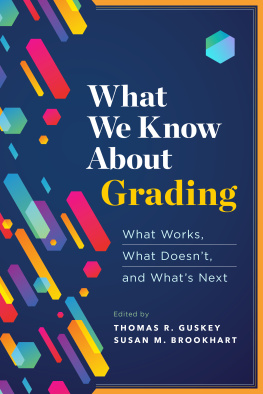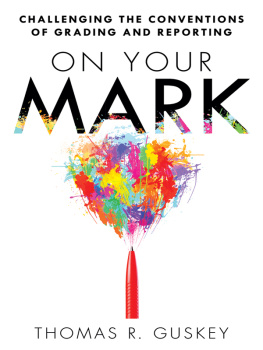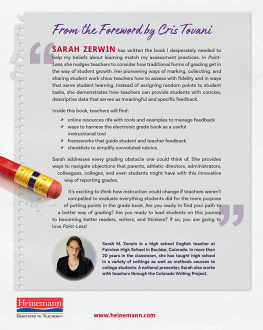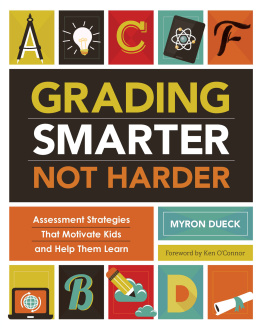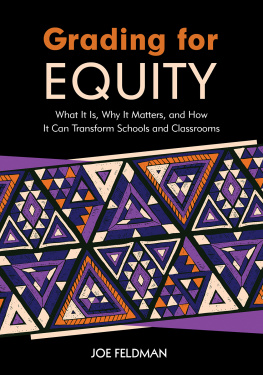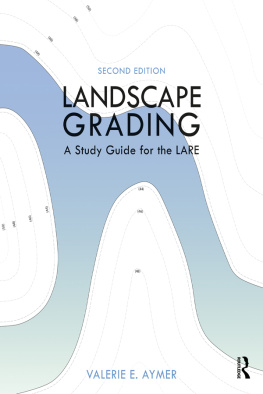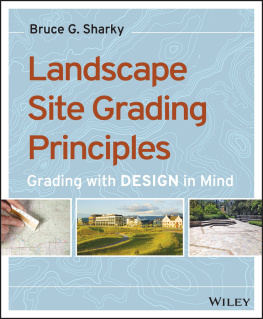Contents
Guide
Pages
Dedication
....................
We dedicate this book to the school leaders, teachers, and researchers around the world who are working to understand and improve grading and reporting, especially those with whom we've had the privilege to work. Their dedication and commitment to doing what is right and better for students are a constant inspiration to us.
Introduction
Thomas R. Guskey and Susan M. Brookhart
....................
Grading is one of the most hotly debated topics in education today. If you want to start an argument about some aspect of education, you need only bring up the way teachers grade. Everyone who has gone to school has experienced some form of grading, usually beginning in early elementary school, and most of us have negative associations with it. We remember a disappointment, a frustration, a wrongdoing, or an injustice. Common refrains include "The grade didn't reflect what I learned," "The teacher didn't like me and gave me a bad grade," and "It just wasn't fair!" (Guskey, 2006).
Grades are the symbols assigned to individual pieces of student work or to composite measures of student performance created for report cards and other summative documents. Grades can be letters, numbers, figures, or any set of descriptors that designate different levels of performance. They are used in preschool and kindergarten through graduate and professional schools throughout the world.
Grading is typically the last element addressed in education reform efforts. Most reform initiatives begin with the articulation of curriculum goals or standardsthat is, what we want students to learn and be able to do as a result of their experiences in school. Next, we consider what evidence best reflects that learning and examine issues associated with student assessments. After that, we focus on the quality of instruction and how best to help students achieve the established goals or standards. Finally, we turn to gradingthe matter of effectively communicating assessment results and other measures of learning to students, parents, and families. We take grading on last and always with some reluctance, because changing grading policies and practices means challenging some of education's longest-held traditions.
Most of us have strong opinions about grading based on our personal experiences in school. And because those experiences vary widely, so do our opinions. In light of this reality, it is extremely important that grading policies and practices be based on trustworthy research evidence rather than personal experience.
Educators involved in grading reform today often take guidance from education books and blogs. In the past 15 years, dozens of books have been published on the topic, all offering guidance to educators in their reform efforts. A quick Google search identifies a multitude of blogs on grading issues. There are even Facebook pages and regular Twitter chats devoted to the topic of grading.
Busy, overworked educators often assume that these book authors and bloggers have studied the research on grading in detail and thoroughly understand the knowledge base derived from the body of evidence on grading amassed over the past century. But that is seldom the case. Some grading book authors fail to cite any significant research on grading, and most grading bloggers do the same. Others cite research they clearly have not read, drawing inferences from summaries that may or may not be accurate. This problem is exacerbated when well intentioned but only partially informed consultants offer passionate and inspiring presentations on grading issues filled with "I believe," "I think," or "In my opinion" statements based on their personal philosophies about grading.
Although we admire the passion and commitment of authors, bloggers, and consultants who devote their time to grading issues, arguments based solely on personal philosophies or opinions are rarely convincing to teachers, students, or their families. They also do not win the support of skeptical policymakers or school board members, who fittingly ask, "Where's the evidence?" Advice with no firm grounding in reliable research will simply not advance reform efforts.
Unfortunately, grading practices today are largely based on tradition rather than on a thorough understanding of the research literature. We do what we do simply because "we've always done it that way." In fact, some of the longest-held traditions in education involve the way we grade students and the consequences we attach to grades. Successfully challenging those long-held traditions requires strong, defensible evidence showing that recommended reforms are actually better and provide specific benefits for students, parents, and families.
Despite efforts to convince them otherwise, most students and their families do not share educators' interest in the philosophy behind grading. Unless they are personally affected, they generally don't care too much about any inequity built into policies and practices. Further, they do not consider grading reform a "moral imperative," as some writers and consultants suggest. What students and their parents want to know from educators, especially at the middle and high school levels, is straightforward: how to get the highest grade possible or, more specifically, how to get an A (Guskey, 2016). This is understandable, as final grades follow students to different schools, go to college admissions departments, and may even be viewed by potential employers.
When considering change in well-established grading policies and practice, all stakeholders want to know "Why?" They want to know what evidence supports the change and how trustworthy that evidence is. They want to know whether the evidence comes from contexts similar to theirs. Most important, they want to know the probable outcomes of the change and whether the reforms will truly benefit students or potentially harm them. In other words, they want to know what research supports the change and how that evidence informs the change process.
About the Research
Although grading has been a part of education since antiquity, only in recent years has it become a major focus of education practitioners, policymakers, and researchers. This new attention has revealed that the grading policies and practices used in most schools today have remained relatively unchanged for decades (Brookhart, 2009; Guskey, 2000, 2001; Haladyna, 1999). And this is not because they are especially effective, but because they are steeped in traditions that many stakeholders believe have served us well (Guskey, 2013). As a result, changing the way we grade and report on student learning progress in school often becomes the most challenging aspect of any educational reform effort.
Some reformers believe the solution to most grading issues lies in technology. Educators today have their choice from a slew of online grading programs that use mathematical algorithms to calculate grades, thus limiting teacher decision making and offering the pretense of objectivity (Guskey, 2002a, 2002b). Other reformers believe breaking grades down into specific components related to different learning standards will solve the probleman approach known as "standards-based grading" (Guskey, 2009). Still others want to abandon grading completely, believing the process debases learning, causing students to focus more on earning high grades than on improving their skills and understanding (Kohn, 1999). Regardless of their stances, few educators today know about the long history of grading research and its implications for more effective practice, having lacked a truly comprehensive guide to the most up-to-date literature on the subject. This book is designed to be just that.

